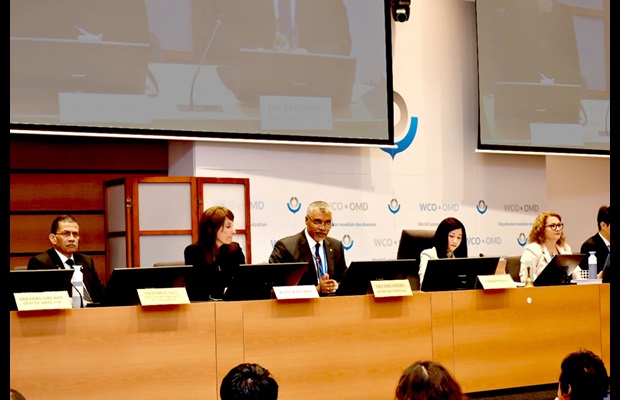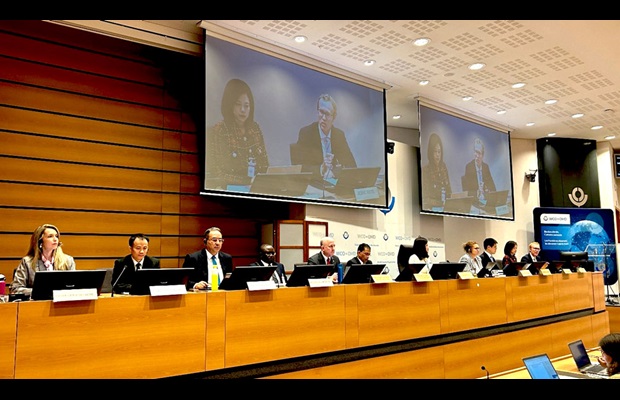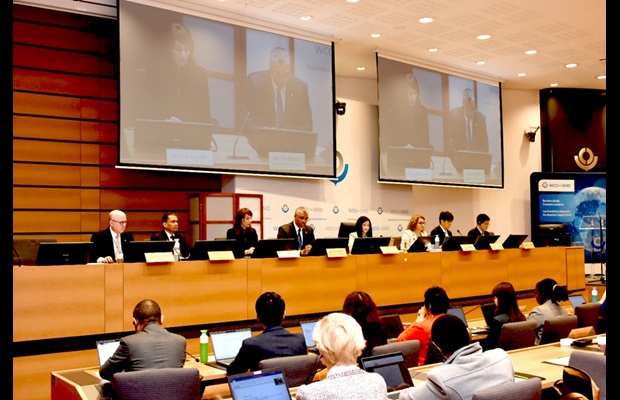
Driving the Future of Customs: Insights from the 245th/246th Sessions of the PTC : WCO
BRUSSELS : The 245th/246th Sessions of the Permanent Technical Committee (PTC) were held from 23 to 25 October 2024, at the World Customs Organization (WCO) Headquarters in Brussels, Belgium. The meeting gathered over three hundred delegates from WCO Members, international organizations, the private sector and academia to discuss, guide and endorse work on a variety of topics. The diverse perspectives and experiences brought depth and insight to the discussions. Since its inaugural meeting in April 1953, the PTC has been instrumental in advancing trade facilitation tools and addressing the evolving challenges Customs authorities face today.
On day one, Angela Ellard, Deputy Director-General (DDG) of the World Trade Organization (WTO), delivered a keynote address that underscored the deep and long-standing collaboration between the WTO and the WCO. She highlighted their synergies in implementing the Trade Facilitation Agreement (TFA), including advancing digital customs, and addressing sustainability through green Customs initiatives. The DDG noted the critical role of WCO instruments and tools like the Harmonized System and the WCO Data Model in shaping WTO policies, particularly in digital trade and single window procedures. Also emphasized were the WTO’s active discussions on digital trade policies, where the WCO has contributed key insights, particularly during workshops under the multilateral work programme on E-commerce. Additionally, the DDG previewed the forthcoming Memorandum of Understanding (MOU) between the WTO and WCO, aimed at formalizing and deepening cooperation in areas like e-commerce, supply chain resilience and MSMEs integration into global trade. The DDG’s address reinforced the need for continued collaboration to tackle evolving global trade challenges and enhance the efficiency, security, and sustainability of cross-border trade.


In his opening remarks, WCO Secretary General (SG) Ian Saunders, thanked delegates for their expertise, experience and commitment in advancing trade facilitation issues. The SG also extended special thanks to the WTO DDG for the her keynote address, describing it as important and inspiring. The SG emphasized the strong synergies between the WCO and WTO, noting that trade policy and Customs practices must evolve together to meet the challenges of the global trade environment. The SG reminded delegates of the rapidly evolving trade environment, driven by technological advancements and increasing complexity, and emphasized the need for Customs administrations to adapt and modernize by equipping themselves with the necessary tools. The SG reaffirmed the three guiding pillars of the PTC: strengthening global collaboration, embracing technology and innovation, and enhancing adaptability and sustainability, which are crucial for navigating today’s trade landscape. Noting the significant participation of over 300 attendees, the SG concluded by encouraging active engagement from all delegates in shaping the future of Customs.
Following the opening remarks, the PTC discussed the implementation of the E-Commerce Framework of Standards, with presentations from Members and private sector stakeholders. Progress in cross-border e-commerce was noted, along with outcomes from the WCO Symposium on removing counterfeits from e-commerce, underscoring the need for collaboration. Later, delegates received updates from the Single Window Mini Group on ongoing efforts to revise the Single Window Compendium, reflecting advancements in streamlining processes, fostering interagency cooperation, and adopting new technologies. The progress in the Smart Customs Project was also discussed, focusing on promoting the adoption of innovative technologies to reduce the digital gap among Members.
On the second day, discussions kicked off with the Green Customs Action Plan (GCAP), where delegates noted significant progress, including actions on waste shipment control, plastic waste workshops and updates to the Harmonized System, demonstrating the WCO’s dedication to global sustainability. The PTC then received updates on the legal feasibility study for the Customs Data Exchange Platform (CDEP), which aims to enhance risk management and generate revenue through automated data exchange, while addressing key legal aspects like data ownership, cybersecurity and privacy. The ongoing feasibility study on the Interconnectivity Framework for Certificates of Origin (CO) was also reviewed, highlighting progress towards seamless global trade. Delegates then examined updates on the Glossary of International Customs Terms to ensure its relevance in the evolving Customs landscape. The PTC endorsed the revised Guidelines on Cooperation Between Customs and Port Authorities that aimed to addressing challenges such as undeclared abandoned containers and improving trade facilitation with input from private sector partners. Discussions on the WCO Practical Guidance on Free Zones focused on expanding AEO programs and enhancing Customs controls, emphasizing the need to adapt Customs practices to evolving trade dynamics.
On the third day, the session began with presentations from UNICEF and Benin on Customs’ role in disaster relief, underscoring the importance of facilitating the movement of essential medicines and vaccines during crises and emphasizing preparedness for humanitarian aid. Following this, the PTC held an in-depth discussion on the WTO Trade Facilitation Agreement (TFA), featuring a panel with representatives from Cameroon, Peru, Vietnam and the WCO-SECO Global Trade Facilitation Programme. The panel explored how National Committees on Trade Facilitation (NCTFs) can foster cooperation between Customs and other stakeholders at domestic level. The Chair of the WTO Trade Facilitation Committee and the WTO Secretariat addressed the developments taking place in the WTO and the state of play regarding TFA implementation. The examples provided demonstrated the significant benefits of such collaboration in implementing the TFA, aligning with the WCO’s 2024 theme of “Customs engaging traditional and new partners with purpose.” The PTC then focused on the Time Release Study (TRS), which measures the efficiency of border procedures. Updates included exploring alternative funding for the TRS Database System, and progress on the TRS Guide, highlighting the WCO’s commitment to enhancing Customs efficiency through data-driven analysis and interagency cooperation.
Pranab Kumar Das, Director of Compliance and Facilitation, closed the PTC Sessions by expressing heartfelt gratitude to the delegates for their contributions, commending their passion and expertise in shaping customs practices. Reflecting on the past five years with the PTC, the Director announced that this would be his final meeting in the role and expressed appreciation for the opportunity to contribute. The Director emphasized the importance of collaboration in addressing emerging challenges and praised the diverse topics covered throughout the meeting. Thanking all participants for their active involvement, the Director acknowledged the organizing team and technical staff, and extended his best wishes for the success of future meetings. Following the closing remarks, delegates and staff joined in warm applause, honoring the Director’s dedication and achievements and unwavering commitment to the Customs community.

